Whitman’s speculation below, misquoted (just a bit) by a character in the 1988 movie Bull Durham, speaks to the peculiar American-ness of baseball. It’s a game that traces its origins to England, but became wholly ours in the nineteenth century. Played first in New York, baseball then expanded throughout the country thanks to the Civil War, which brought young men and boys together en masse. During this tragic period in our nation’s history, they needed a way to pass the time that didn’t involve weaponry.
For the McKeever family in Hanover, baseball is central to family life.
Son Aaron, sixteen, is a catcher for the Atlee High School baseball team and also plays third and first base for a travel baseball team. His sister, Shannon, eleven, plays Little League and travel softball. She’s also a catcher. Husband Jim has coached teams for both kids, at Little League and in travel leagues. Mom Korin keeps the schedule straight and watches a lot of games.
“If [the kids] love it, I love it,” Korin says.
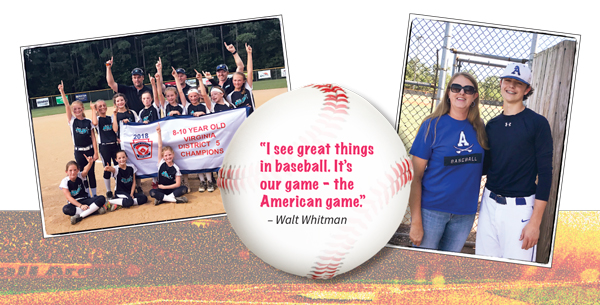
Aaron also plays volleyball and basketball on school teams, but baseball comes first.
“Aaron has loved baseball since we got him a little plastic ball and tee for his third birthday,” Korin says. “It was all he wanted to do, all the time. We had a bucket full of wiffle balls with a tee in the driveway. He couldn’t even say ‘ball’ when he started.”
The McKeevers enrolled Aaron in a tee-ball program with Mechanicsville Little League when he was four, eventually moving him over to Atlee Little League. Jim, who had played baseball throughout high school, coached Aaron’s team there and also served on the Little League board.
When Aaron was a little older, Jim and another player’s dad started a travel team. Korin says she and her husband wanted the boys on the team to have a chance to play more competitive games, but didn’t want to go overboard.
“We saw that some parents were over-invested,” she says. “My husband and the other dad agreed that the [travel] team didn’t need to play every weekend. They wanted their kids to play, but for the travel team to not be the only thing they did.”
Korin says the benefits of baseball go far beyond the physical.
“For Aaron, it has given him the opportunity to play with a team and realize that it’s a combined effort,” she says. “It’s good for kids to meet and get to know kids who they might not know from school.”
While Korin doesn’t know if her son will attempt to play baseball in college, she’s happy with his experience.
“Sometimes, it’s tough, and sometimes, there are tears,” she says. “Even with the good and the bad, we love it. The kids are having a great time.”
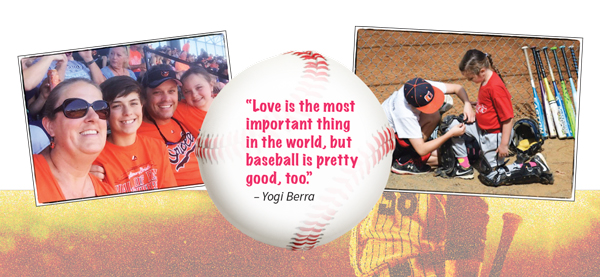
Career Opportunities in Baseball
Eliezer Zambrano has made much of the opportunities baseball has brought him.
As an 18-year-old in Valencia, Carabobo, Venezuela, Zambrano was recruited by the San Francisco Giants as a catcher. Now thirty-two, Zambrano is the bullpen coach for the Richmond Squirrels – the Double-A affiliate of the Giants – and a resident of Henrico County, where he lives with his wife and two girls.
“I love it here,” Zambrano says. “People here support my family and career.”
Zambrano notes that by the time a major league player reaches his mid-thirties, he’s either a marquee name or he’s found a new line of work. He says he’s worked hard over the years to accommodate the Giants’ requests of him, often moving during a season to meet a need in a certain location.
“It’s about understanding your job and your role in the organization,” he says, adding that he strives to make the best from every experience.
“It’s about teamwork – working as a team – dealing with differing opinions with the guys and coaches,” he says. “You learn a lot every single day from different people.”
While it’s relatively uncommon in professional baseball for players to make the switch from playing to coaching, Zambrano says the Giants like to promote from within.
“They like to have people who already know their system,” he says. “It shows confidence in people, on and off the field.”
Beyond the stadium, Zambrano is happy he’s been able to do everything he wanted: marry the woman he loves from Venezuela, manage their long-distance relationship until he was financially stable and could support her move to the U.S., and start a family. Their first daughter, who is now five, was born in San Jose, California; their second daughter was born in Richmond last fall.
Zambrano says his older daughter always wants to play catch with him and already has her own cleats, bat, and glove. “She wants to do a little bit of everything,” he says. “She’s still figuring out what she wants to do.”
Zambrano says the Giants and the local Squirrels organization have built a “pretty impressive” connection with the Richmond community. He credits Todd “Parney” Parnell, vice president and chief operating officer, for creating a welcoming and entertaining atmosphere.
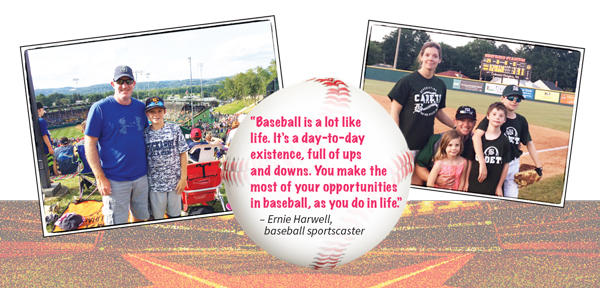
“Parney is a leader, a funny guy, very smart, and he always supports me as a player and as a coach,” Zambrano says. “The front office works hard during the season, but they work harder in the off-season.”
Flying Squirrels General Manager Ben Rothrock says bringing a new Double-A team to Richmond in 2009, after the departure of the Triple-A Richmond Braves, was no small task. But management had a clear goal: engagement.
“At first, there was a lot of intrigue about us – who are we, what do we do, what do we stand for,” Rothrock says. “But our motto with everything is ‘Let’s go all in.’ We try to create the best atmosphere we possibly can, and we aim to be heavily involved with the community.”
That involvement reveals itself in a variety of ways. A front office conference room whiteboard, showing the season’s schedule, is filled with the names of businesses partnered with the Squirrels for promotions. The team’s Squirrels in Schools program rewards reading and good grades with tickets and includes an art competition. The team encourages group sales and sponsors special events, such as theme nights and concerts.
New this year, The Diamond has a nursing lounge, originally suggested by a mother who owns a local company, Latched Mama, to provide a private space for nursing mothers. The room includes a couch, charging station, changing area, and refrigerator. Rothrock says mothers with infants are welcome to breastfeed their babies wherever they are most comfortable, noting the room is designed to be another option.
Also new this year is the Squirrels’ participation in Minor League Baseball’s Copa de la Diversión (Fun Cup), an initiative designed to honor and celebrate the Hispanic and Latino communities in Richmond. For every Friday night home game, the Flying Squirrels will become Ardillas Voladoras, with Latin-themed pregame entertainment, contests, specialty food, and new uniforms and logo.
It’s about connecting with the community, Rothrock says, noting that the Squirrels’ front office reached out to Minor League Baseball to join the program, now in its third year.
“We don’t want to appeal just to baseball fans, but to families,” he says. “We want to be ingrained in the community, no matter what walk of life someone comes from.”
The effort seems to be paying off. Every year since the team came to Richmond, attendance has placed the Squirrels either first or second in the Double-A Eastern League.
Rothrock’s own family connection to the game is significant: He met his wife at the stadium – she was an employee not keen on losing the R-Braves – and they now have two children: a 2-year-old girl and infant son. His daughter already has her own baseball set and will ask Rothrock in the morning, as he leaves for work, if he’s going to see mascots, Nutzy and Natasha.
That’s what it’s all about, he says: fun.
“We pride ourselves on entertainment, fun, and family,” Rothrock says. “We see multi-generational families come to enjoy the games. It’s about creating a lasting memory for them.
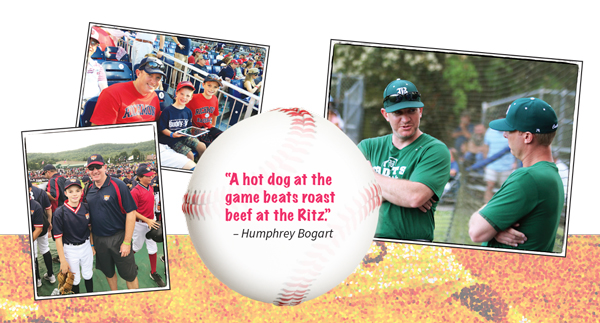
A Closer Look at Stats and Trends
Baseball’s claim of being America’s pastime is in the eye of the beholder.
According to annual research conducted by the nonprofit Sports & Fitness Industry Association (SFIA), a trade organization of manufacturers, retailers, and marketers in the sports products and fitness industry, the number of people – both youth and adults – playing baseball nationally has been rising in recent years, although youth involvement seems to be stagnant, with only a 0.6 percent increase in participation over the last two years for people ages six or older who play once or more per year.
In 2017, the most recent year’s data available from SFIA, there were 15.6 million baseball participants in the U.S., with about a quarter of those being youth (boys and girls) under the age of eighteen who play baseball more than thirteen times a year.
Softball, which is more often played by girls than boys, seems to be on a downward swing, with both slow- and fast-pitch participation numbers declining, to roughly 2.3 million fast-pitch participants of all ages and 7.3 million slow-pitch participants nationally.
Devon Corrigan, Little League District 5 administrator, says it can be difficult to get a clear picture of baseball participation because kids have more options than ever with where and how they play. In addition to Little League, an international organization headquartered in Williamsport, Pennsylvania, other leagues, such as Dixie Youth Baseball and Babe Ruth League, are available, as are more competitive travel leagues (e.g., AAU, USSSA) that take players regardless of where they live. There are also county parks and recreation leagues.
“Little League was designed to work hand-in-hand with the community and ensure everyone could play,” Corrigan says. “Our motto is ‘We put the fun in fundamentals.’ Travel baseball is a higher level of competition with more skilled players. It’s become so easy for anyone to start a travel team that people are flocking to it. That’s impacted league play for all organized youth league baseball.”
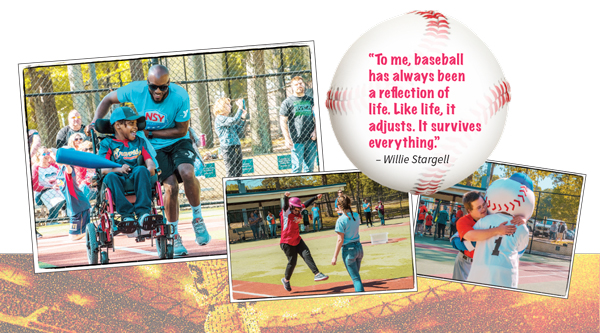
Corrigan, who has been involved with Little League as a volunteer in one capacity or another for the past twenty-five years, says he’s seen a 30 percent decline in Little League participation numbers over the last decade, noting that both the Huguenot and Mechanicsville Little League programs have dropped from two internal divisions (American and National) to one, due to lower numbers. In District 5, which includes ten leagues and has 5,688 players, only one Little League – Tuckahoe, in western Henrico, with 1,271 players – is large enough to warrant American and National divisions.
In addition to a variety of ways kids can play baseball, Corrigan says, there are more sport options than ever before.
“When I was growing up, it was baseball in spring and summer, football in the fall, and basketball in the winter,” he notes. “Now, kids have lacrosse, soccer, even hockey. Parents have options for their kids, and you have to offer a quality product to parents early on. I tell my presidents: You have to offer a meaningful experience. We’re trying to be about more than winning baseball games.”
Sean Ryan, a two-year captain of the University of Richmond’s baseball team and now head baseball coach at Benedictine College Preparatory School in Goochland, says he thinks many families find baseball appealing because it doesn’t seem to lead to as many injuries as other sports do, noting that a focus on the danger of concussion may steer parents away from football.
But, Sean notes, baseball has its own perceived drawbacks.
“Baseball’s biggest issue – whether major league or Little League – is that many youth and adults find it to be boring, that not enough happens,” Sean says. “But I love that it’s a battle between the pitcher and the hitter. There’s the uncertainty of not knowing what’s going to happen, pitch to pitch, where the ball can go, whether it’s in play at all.”
Sean credits the Flying Squirrels with creating baseball excitement in the area.
“The impact the Squirrels have had on our community is profound,” he says. “What they have done in terms of community events and instilling more fun in their games … there’s no doubt in my mind that has done wonders in promoting baseball to families and their children in the past ten years.”
Sean says he and his wife, Chelsea, who played basketball at UR, have encouraged their children – two boys and a daughter, ages fourteen, eleven, and seven, to play sports. Of their three, their oldest is most involved with baseball, having started “as early as you can” at Tuckahoe Little League.
“He’s really enjoyed it; he’s had a good time,” Sean says. “It’s still too early to determine what his best sport is. For now, it is about being part of the team and trying to contribute to the team.”
Sean says he and Chelsea believe their kids can learn plenty from sports.
“It’s important for both of us to instill in our children the importance of athletics in building confidence and meeting new kids,” Sean says. “We believe athletics are important for them to do as well as other activities, like dance for our daughter, and music lessons for our older son.
“Athletics has meant a lot to both of us, and we want to pass that along to our children,” he adds.
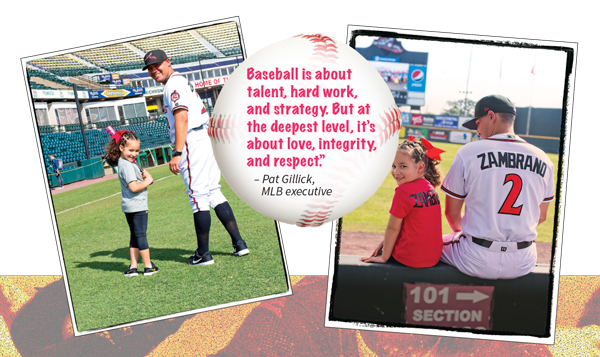
The Bird Athletic Complex in Chesterfield County has tennis courts, walking trails, a playground, and baseball fields – one of which looks a little different than visitors might expect. Constructed in 2007, the field is completely accessible to players of all abilities, with a rubberized surface, limited tripping hazards, and dugouts that are at field level and deep enough to allow for wheelchair navigation.
Built by the Richmond chapter of Miracle League, a nonprofit organization created to encourage and allow participation in baseball for people with intellectual or physical disabilities, the field hosts games in the fall and spring.
Last fall, Miracle League became a program of the Greater Richmond YMCA, following the retirement of its local president and founder, Karen Pusey.
“Karen did a fantastic job of getting Miracle League where it is and helping families find a space where they could be able to play,” says Katie Gholson, the Y’s director of access, ability and community engagement. “Other Ys around the country have partnered with Miracle League; we don’t want this to go away.”
Little League offers a similar program, the Challenger division, but the Bird field is the only one in the region that is fully adaptive in design. Gholson says the Y hopes any youth will feel comfortable participating.
“This is open to anyone who feels like they can’t play traditional baseball,” she says. “We have a gamut of differing abilities among our players. We’re open to what it looks like.”
Gholson notes that each player is paired with a volunteer, who may assist with retrieving a ball, circling the bases, or simply encouraging the player through social interaction.
“It’s such a great environment; everybody cheers for everybody,” she says. “Parents are super-excited to see their kids do something they maybe never expected.”
Gholson says the Y hopes to increase participation in the fall so another game could be held weekly. No plans are in the works to build another accessible field, but that could happen later, she says.
For families like the Ryans and the McKeevers, baseball connects them to their community while bringing them together as a family.
“Baseball allows us to spend a lot of time together,” Korin McKeever says. “I’m going to miss it when it’s over.”
The Little League’s Corrigan agrees that baseball’s benefits are apparent to a broad range of RVA families.
“Do we have a decline in baseball participation on the national level? I think we do. I think the numbers would bear that out,” Corrigan says. “But baseball and softball have a pretty strong pulse in Central Virginia. I think that for this district, we’re doing okay.”
Photos: Danny Hooks, Scott schwartzkopf




